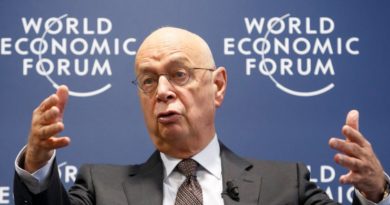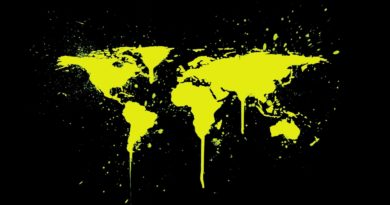How the Powers-That-Be Are Using Russia-Ukraine to Make America Commit Economic Suicide
In the movie Bourne Identity, the big reveal near the end has the antagonist explaining to hero Jason Bourne that he was sent in to kill an inconvenient world leader. The reason he was sent in instead of just using SEAL Team Six or a CIA sniper was because they needed it to look like the leader was killed by his own men. They arranged to get super-human weapon Bourne on the leader’s yacht so that when he was killed, it would appear as if someone in his crew pulled the trigger.
Doing this would keep the United States from being seen as sending an assassin. If all had gone as planned and Bourne hadn’t tapped into his repressed conscience just before taking the shot, the leader would have been killed and the killers would have gotten off scot-free. They could then swoop in as the good guys to stabilize the nation and usher in a regime of their choosing.
The World Economic Forum and their cabal of globalist elites need the world economies, particularly America’s economy, to collapse in order to achieve their goal of The Great Reset. To get the people to willfully accept the precepts of Neo-Marxism inherent in the tenets of The Great Reset, all other alternative systems must fail. Most Americans and arguably most citizens of the world would not accept The Great Reset unless it was the only choice.
But they have a challenge. They can’t just crash all the markets and rebuild from the ashes. They cannot be anywhere near the scene of the crime or the people may look at these elites as the root cause of the problem. If they thought they could get away with it, they would simply crash the markets and cause mass chaos. Yes, they do have that power, but they can’t wield it until economic collapse seems inevitable. Then, if they choose, they can strike the death blow by claiming that doing so is necessary for the rebuilding process to begin.
For their plans to work, they need America to commit economic suicide. Thus, we have the war in Ukraine. Skeptics will now chime in and claim that Klaus Schwab and the WEF do not control Vladimir Putin or Volodymyr Zelennsky. But just as Rothschilds and Rockefellers have done in the past, the globalist elites do not need direct control in order to manipulate the situation enough to cause their desired actions, even at a national level. Besides, I’m pretty sure Zelensky is beholden to Schwab, George Soros, Barack Obama, and other leaders of the cabal. And I wouldn’t say for certain that Putin isn’t somehow compromised, either.
The sanctions that governments are imposing on Russia combined with boycotts coming from major players in the private sector will not dissuade Russia from continuing forward. Their leaders cannot afford such a loss, so they will push forward to the bitter end. As Chris Cappy told me yesterday in an interview that will air soon, Putin would bomb Kyiv and call it a victory before he’d be willing to withdraw without his prize.
Therefore, the sanctions being placed on Russia at the behest of Soros, el al., will only serve to harm the Russian people as well as pretty much every other person on earth who isn’t part of the cabal. If the sanctions continue — and at this point they appear to be indefinite — then most of the world’s economies, particularly the U.S. economy, will eventually collapse.
For those who think my predictions are overblown, they’re not actually mine. The effects of the sanctions are concisely detailed in the article below by Gregory T. Chin from Free West Media:
Economic Sanctions Can Lead to Dire Unintended Consequences
From soaring gas prices to another world war, economic sanctions can lead to dire unintended consequences
Western governments have united to bring in a number of serious economic sanctions against Russia in retaliation for its violence in Ukraine, including the latest announcement that the United States is revoking Russia’s “most favoured nation” status that will impose new trade tariffs. The moves were not a surprise.
The U.S. and its western allies have increasingly turned to sanctions, investment bans, embargoes and other forms of economic warfare over the last two decades.
But sanctions and economic warfare give rise to unintended consequences. They can divert from diplomatic mediation and dialogue. They also carry a price for those applying the sanctions, as well as third parties who may be indirectly impacted by the sanctions.
The desire to use these financial tools is understandable, especially by the U.S. government, because it means avoiding armed conflict. After two decades of war in the Middle East and Afghanistan, economic warfare is more acceptable to war-weary western societies than boots on the ground.
Powerful nations often use economic warfare measures to avoid protracted or difficult diplomatic negotiations, or to weaken the target country for negotiations. Sometimes countries impose sanctions as a way to play for time or to strengthen their negotiating hand.
Imprecise tools
However, sanctions and economic embargoes are also imprecise tools — even the highly tuned interventions into bank accounts and financial flows which the U.S. government developed after 9/11 to go after terrorist financing. They also have spin-off effects, which may not be predicted beforehand.
Research finds that the unintended consequences of economic sanctions and financial warfare measures are difficult to predict at the outset — and the more severe and encompassing the sanctions, the greater the unintended consequences.
Consumers in North America and Europe are seeing it now in surging gas prices. More inflation and supply problems are to come in western economies as the sanctions against Russia take effect.
The developing world is also feeling the war’s impact on grain supply and the unintended effects of the sanctions in surging food prices and other commodities. Food shortages will once again destabilize societies in the developing world, as they did in the past with food riots in Egypt in 1977, 1984 and as recently as 2017.
Food prices will be impacted
Countries in Northern Africa and the Middle East are already on high alert as the war and wheat prices surge and cut into their staple grain supply from Ukraine and Russia. South Africans are concerned about surging prices of energy and bread, which will hit the poor especially hard even as they try to recover from COVID-19, and about the more than 200 South Africans (mainly students) fleeing Ukraine for safety.
But there are other inherent dangers. Over-reliance on sanctions and economic warfare measures have led to strategic complacency and the avoidance of negotiations on the part of the governments of the western nations.
The announcements of sanctions against Russia are coming fast and furious. Politicians are anxious to announce their latest punishment of Russian President Vladimir Putin, Russian oligarchs and the people of Russia.
As a Canadian diplomat I witnessed the intended and unintended effects of U.S. sanctions on the assets of North Korean entities in a Macau-based bank in 2005. I’m currently researching the unsuccessful use of U.S. financial sanctions on Hong Kong and China in response to the implementation of the National Security Law in Hong Kong. I’m concerned the flurry of economic sanctions against Russia lack strategic clarity. Simply saying the sanctions are meant to punish Putin and Russian elites for their actions is not a serious strategy.
How will impacts be measured?
Other questions need to be answered: What mix of diplomatic tools are sanctions and economic warfare part of, and toward what end — what exact change in the target’s behaviour? When will we know that economic warfare has worked? How are governments tracking the effects, intended and unintended? When will the measures end, and how?
If the goal is a stalemate or to aid the Ukrainian effort to repel the forces back into Russia, how likely is that to be achieved given the asymmetry in the armed forces of the two sides?
Or is the goal even broader, such as destabilizing Russia to the point of regime change? That too could lead to unintended consequences, especially given the failed record of western governments in dealing with regime changes in smaller countries like Libya, Iraq and Afghanistan.
And what if the sanctions, investment and SWIFT bans, embargoes and arms transfers don’t work? Is there a point where the cost to human life is too high — in Ukraine or other places?
If the Russian military succeeds, would the economic punishments remain indefinitely? While some may make that argument, it would be the end of the globally integrated economy of the last 40 years, especially if China is somehow drawn into the conflict.
China would likely try to broker a cessation in the violence, but would not cease all financial transactions with Russia. That could lead to China developing alternatives to the SWIFT and U.S. dollar payment systems.
The end of an integrated world economy?
One of the truths of the world order since the 1980s is that the world was increasingly open and integrated — especially the world economy, but also socially to a large extent.
Social movements on the political left and right have raged against the globalized world. But there were no major wars between the military superpowers in the eight decades after the Second World War.
The world order is now being undone by all sides.
It is time for leading world powers to think seriously about how to return to diplomacy, as unpalatable as this may be at this point. Though it may sound tepid to call for mediation and dialogue, cooler heads are needed to work toward a ceasefire and to get serious and strategic about finding a negotiated solution in the Ukraine. Off ramps need to be found from the intensifying violence.
Sanctions, embargoes, financial bans and arms transfers with no negotiated end in sight is not the solution, tempting as they may be for western governments. Further escalation only leads to the unthinkable.
Gregory T. Chin — Associate Professor of Political Economy, Department of Politics, York University and former Canadian Diplomat, York University, Canada
Article cross-posted from Free West Media.
All ORIGINAL content on this site is © 2021 NOQ Report. All REPUBLISHED content has received direct or implied permission for reproduction.
With that said, our content may be reproduced and distributed as long as it has a link to the original source and the author is credited prominently. We don’t mind you using our content as long as you help out by giving us credit with a prominent link. If you feel like giving us a tip for the content, we will not object!
JD Rucker – EIC
@jdrucker
This article has been archived for your research. The original version from Based Underground can be found here.






